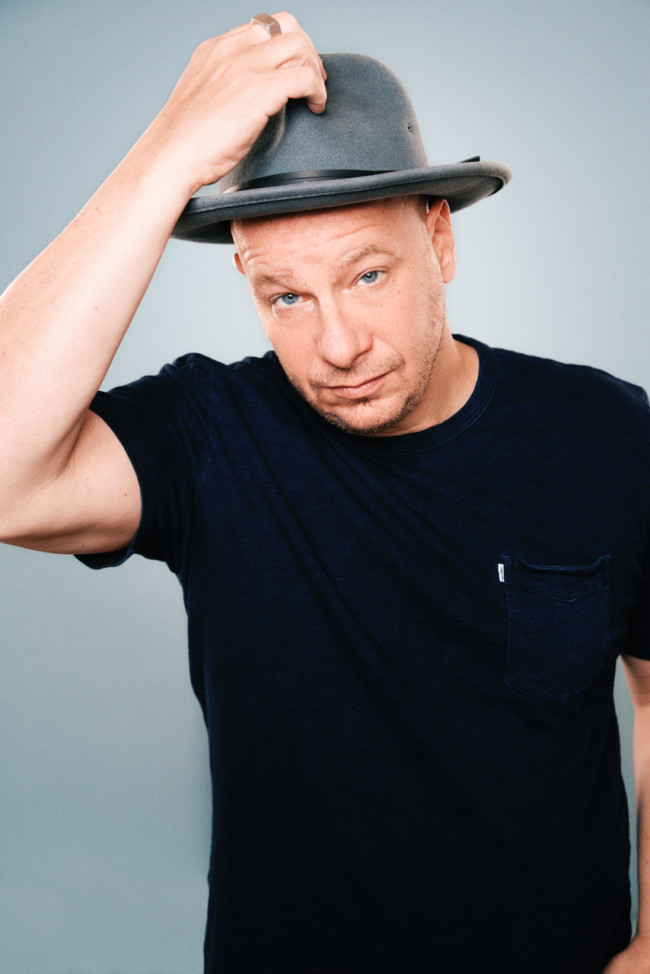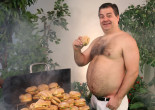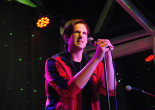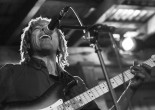Roastmaster Jeff Ross on open mics, Northeast audiences, and his bromance with Dave Attell

Comedian Jeffrey Ross has been dubbed the “Roastmaster General” for a reason – his quick-witted insult comedy has made him one of the best in the business, feared by big celebrities and common hecklers alike. He never misses an opportunity to offend sensibilities and bust balls, reaching new heights of fame with his brutal takedowns of big stars on Comedy Central Roasts and shows like “Roast Battle.” He even brings volunteer audience members up on stage for a little impromptu ribbing, but underneath that thick skin and those harsh words lies a friendly, good-natured guy who draws the line at bullying those who don’t ask for it and really just wants to bring people from all walks of life together for a good, hearty laugh.
That’s what NEPA Scene found when we had the opportunity to chat on the phone with the 52-year-old New Jersey native before his unique show this Friday, March 23 at 8 p.m. at the Sands Bethlehem Event Center, where he’ll share the stage all night with fellow veteran comedian and longtime friend Dave Attell. Their Bumping Mics tour also stops at The Music Box at the Borgata Hotel & Casino in Atlantic City the following night at 8 p.m.
With his hometown of Springfield not too far from Northeastern Pennsylvania, we started our conversation by talking about his own local scene and the sometimes unforgiving open mics he frequented that made him the battle-hardened funnyman he is today, hoping to get some tips for participants in our own NEPA Scene Rising Talent open mic and talent contest before it returns on Tuesday, March 27 for another 12-week run. From there, we get into how Jersey and East Coast attitudes toughened him up, how he met and stayed friends with Attell, his last show in Bethlehem and what makes this tour unique, surprising audiences around the world with Chris Rock, when to expect the next celebrity roast, his new podcast with some surprising topics, and more.
NEPA SCENE: NEPA Scene hosts an open mic here in Scranton, so I wanted to start by talking about your early open mic days for a minute. What were your first open mics like?
JEFF ROSS: My very first one was amazing. It was one of the best nights of my life – April Fool’s Day, 1989. Technically, it was March 31st, but it was after midnight by the time I got on. I followed a bongo player. I probably got three laughs in five minutes, but it felt like I killed because they were some of the first three laughs of my life, of my career. And I had a couple friends there, and it was like euphoria. Some chicks talked to me afterwards, there were some sailors in the audience – it was like the greatest thing ever. And then I would say my next 15 times were terrible, but luckily I had one good one to get me going. Or else I might have quit. Who knows?
NS: What made you say, “I’m going to continue doing this anyway?”
JR: Because even when I was doing bad, for some reason I had the instinct that it wasn’t all bad. I’d have little moments of, ‘Whoa, that worked.’ I would always think back to that first one, going, “How do I get back to that raw energy?” And it was always nerve-wracking because people are curious. Your friends starting coming out. You’ve been talking about stand-up. I took a comedy class before I even tried my first open mic to learn the basics. I had nothing else going on either. It was sort of… I wouldn’t say desperation, but just so eager to have some social life, and comedy also gave me something to do at night, a chance to meet people and have a little fun.
NS: Are open mics still essential to comedians wanting to get into this business?
JR: Well nowadays, people sometimes don’t even do that route. They go right to YouTube with their amateur comedy and that sort of propels them, so things are a little different now, but for me as a live performer, I had to go that route. I didn’t know what else to do.
NS: Do you feel that’s just as legitimate as people who perform live?
JR: Well, I mean, it’s a different skill. I’m not going to deny what people are doing and how they get there. Everybody has their own crazy journey. When you’re on YouTube, you get to do a million takes and edit it, but when you’re a live performer, you’re basically like a sumo wrestler or a baseball pitcher or a tennis player – you’re out there by yourself and you’re naked. You’re only as good as your last joke or your last pitch or your last punch. It’s pretty scary.
NS: So now that you’re at the level that you are, do you go to open mics anymore?
JR: Oh, I do them all the time. Whenever I’m getting ready for a big show, I tend to hit whatever is convenient. If there’s an open mic in my neighborhood and I can get another five to 10 minutes to practice something, I have no pride about it. I go right to the open mic. They might be happy to see me for the first joke or two, but you really got to do a good job to get those laughs.
NS: Have those kinds of rooms changed at all over the years or is it still about the same?
JR: That’s a good question. They’re probably about the same. They’re cruel, they’re tough. I can’t imagine starting out. It’s tough, always. I don’t know. Maybe you would know better than me? What’s it like?
NS: It’s good overall, but it can definitely be tough some nights. We have a good mix of musicians and comedians, and if they don’t like a musician, they’ll just ignore them or talk through their set, but with comedians, they’ll go right for the throat if they don’t like them.
JR: There’s that too. It’s so cutthroat, but anywhere you can get stage time. All those open mics make you strong too. You do a bunch of open mics, then when you’re really up there… I still do gigs that are just as high pressure-feeling, you know? There might be a big movie executive in the audience or your old agent from when you were a beginner and you really want to impress them, a chick you like… There’s always a lot riding on stuff. That stuff gave me thick skin to go forward in show business.
NS: Do you have any advice for those new comedians trying to make it in this business?
JR: Enjoy the process. I always tell myself that. Stick to those open mics, and even when they’re bad, try to put a smile on your face and go, “Hey, did I learn something? Did I write a new joke? Did I get a new laugh?” And try to take those rough nights and take ownership of it. Don’t let it bring you down. Take ownership of it. Let it somehow lift you up, and you go, “Hey, I survived. I’m just going to go back up tomorrow night.” That’s the fun thing about being a comedian as opposed to a filmmaker or whatever. There’s always another show the next night if you’re willing to get up and go to that next open mic.
NS: How did you discover that you had a knack for roasting people and that that would be your niche?
JR: It was a survival instinct. Those were tough crowds back in the early ‘90s around New York and New Jersey and Pennsylvania. I was trying wherever I could. Sometimes you’re in a bar, standing on a makeshift stage under a French fry warmer as a spotlight. The audience is heckling or not paying attention, and a little insult humor wakes them up. It lets them know that you’re in charge and you’re not fucking around. I think it was just also in my blood, in my DNA from growing up in New Jersey, where everybody thinks they’re an insult comic. Everybody is an insult comic!
NS: Is the Northeast tri-state area that same way?
JR: I think the crowds are and the people are, yeah. The East Coast is a very sarcastic, ball-busting, smack talk culture. It just is. You hear about how nice people are in Canada or the Midwest. You rarely hear that about New York, New Jersey, and Pennsylvania. So, for some reason, roasting is like bloodspot, and I remember as a kid everybody busting each other’s chops, and I think that helped prepare me for what I do now too.
NS: So do you turn this roasting on and off or do you just go around silently judging people everywhere you go?
JR: That’s a good question. It really is something I turn on and off. Thank gosh, because I’d get no rest in my brain. It’s exhausting. When I line people up and roast them, it really wears my brain out. That’s why I love working with Dave Attell, because he shares the effort. We can rely on each other to keep the pace up because it is tiring. I do get to turn it off when I’m not on stage. I think otherwise I’d be constantly getting smacked in public.
NS: You and Dave Attell go back a long time. Can you talk about your friendship with him?
JR: Dave is that guy that would emcee those open mics. When I saw him, he was already at it for a couple of years. He was the emcee at the old mic, so I worshipped him. He was the funniest guy in my little scene, and he was the greatest. I admired him so much. I still do. The fact that I get to work with him is a feather in my cap, if you will. And we remain close. We always stayed friendly, but this has really brought us together, I think, being on stage together.
NS: What can people expect from a bill with both of you on it?
JR: That’s a good question – even I don’t know. We went up a couple days ago in Lake Tahoe and I hadn’t seen him in a month. And we don’t talk about it or rehearse or anything. We just kind of come with our own separate thoughts and we talk to each other on stage and look at each other on stage, and we kind of just go back and forth, almost like tennis players, and we engage the audience. You never really know what to expect. What I can tell you for sure is that we don’t go up separately – we go on together, like when two rappers get together. We do an hour together. It really is a true team, and that’s really different than most stand-up.
It’s a sexy show. We talk about sex a lot, so if you want to bring a date, we are definitely good wingmen. We’ll definitely help you get some action because there’s a lot of dirty talk, all done in a goodhearted way – nothing too vulgar. Our styles are simpatico; they sort of fit together. We’re still figuring it out. But I’ll tell you, it’s a show that people seem to love and not forget. We had leprechauns in the audience and they came on stage on St. Paddy’s Day, so who knows what will happen in Pennsylvania? Maybe some Amish people will show up!
NS: Do you like doing these shows in the bigger venues like the Sands Bethlehem Event Center, or even bigger arena shows, or do you prefer the smaller clubs?
JR: Every room has its own personality. We were there last year, about a year ago together, and I remember it being one of the best shows we ever did together. We pop up in little clubs in New York when we’re both in town, but we got booked at the Sands and I got there for sound check and I was like, ‘Wow, this place is big! How are we going to fill it? How are we going to make people laugh from that far away?’ But then as the people came in and it filled up and the booze started flowing and the jokes started slinging, I remember it just being like fire, like a rock concert, and it got real intimate real quick, and the audience was just really great – really, really great. And we’re on a Friday night this time, and Fridays tend to be a little rowdy, and we like that. Our show’s very punk rock. We don’t plan it. There’s always a chance it could collapse at any second, but there’s something special happening between Dave and I right now. I hope people come out and see it.
NS: So many comedians are getting political right now, which is fine, but what you do with your comedy is try to bring people together and find some common ground with everybody, which is great.
JR: Thanks. In this case, I’m bringing me and Dave together. There’s definitely references to politics and everything from immigration to gun control, but it’s all done in a very bipartisan, goodhearted way. It’s more like laughing through the pain than breaking down the issues. We’re all afraid of the same things at the end of the day. And we do leave politics out of the Bumping Mics show. Occasionally in my solo shows I’ll go there, but not with Dave. With Dave, it’s really a party on stage.
NS: You were recently on tour with Chris Rock as a surprise opener. What were those shows like?
JR: That was great. We were all over the world, so I got to perform in big arenas and, since I wasn’t billed, I got to really plan the surprise element of coming out and hitting hard and roasting people on stage right before Chris came out, so it was super fun. I love those shows. Chris is also probably the best comedian – he has the best act in the world right now. I know he’s done touring, but that new special is great.
NS: That’s high praise because you know a lot of comedians.
JR: Going with Chris Rock around the world, I learned a lot. It’s like watching a rock band – there’s a beginning, a middle, and an end, and I just love him as a person.
NS: What are your plans after this current tour?
JR: I’ll probably go back to my “Roast Battle” world. We’re due for another run of “Roast Battle” [shows on Comedy Central]. I love doing that so much because, once again, I get to work with a bunch of funny comedians. Maybe Dave and I will shoot a special. I’m hoping that I can convince him to do more tour dates with me because I love being around him and I love being on stage with him.
And I’m podcasting. When I get done with Dave, I get to go back to my podcast bunker that we built under my house, and that’s really fun. It’s very cathartic to opine about the world. It’s called “Thick Skin with Jeff Ross.” It’s funny you brought up the East Coast mentality; I feel like it almost is a podcast that offers companionship. Every episode, I say, “Life is hard. Let’s get through it together.” I essentially break down or roast whatever’s going on that week or whatever touchy subjects are in the news, which brings me to your first question about what Dave and I are going to do on stage. One thing I can promise your readers is I’m really in full roast mode when it comes to paying tribute to Stephen Hawking, who I thought was a brilliant guy. I come in locked and loaded with some great Stephen Hawking material.
NS: He seemed like the kind of guy who could take it.
JR: I think he would have loved it, and I heard that his last wish was to be buried with his wheelchair so that could rust in peace. There’s one for you.
NS: It has been a few years since the last Comedy Central Roast. Do you have any of those in the works currently?
JR: We’re definitely going to do a roast very soon. We always wait for a huge target to step forward, so have no fear – there will be a roast this year.
NS: The podcast also sounds great. Is that format freeing for you like it is for other comedians?
JR: I love it. I wasn’t sure if I’d like it, but my cousin Ed Larson is a podcaster, and he’s been producing this for me. He built the studio right here in my house, so I’ve only really had friends come over. I interviewed my sister and my aunt, who are schoolteachers, about guns in schools. I interviewed my sister’s mother-in-law, who’s in her 70s, about harassment in the workplace back in the ‘60s. Friends come by, so it’s sort of still an experiment. I’d call it a podcast hobby since this is probably the first time I’ve mentioned it in the press.
NS: We do our own podcast as well, so I know how fun it can be, having uncensored conversations and discussing any topics you want. Is there anything else you wanted to mention?
JR: Me and Dave, together forever, is what we always say, but at any point, one of us could get busy or we could have a big blowout fight, so if you ever want to see me and Dave, two of the funniest, on stage together, this might be your only chance.
NS: Before you guys hate each other?
JR: Nah, we love each other. We’ll be OK.
Location: Sands Bethlehem Event Center (77 Sands Blvd., Bethlehem)
Date: Friday, March 23
Time: 8 p.m.
Cost: $29, $39, and $49
by Rich Howells
Rich is an award-winning journalist, longtime blogger, photographer, and podcast host. He is the founder and editor of NEPA Scene.



